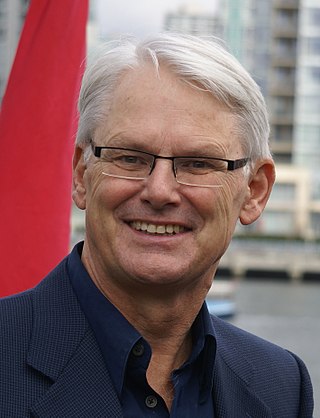National referendums are seldom used in Canada. The first two referendums in 1898 and 1942 saw a large number of voters in Quebec and in the remainder of Canada take dramatically-opposing stands, and the third in 1992 saw most of the voters take a stand opposed to that of the party in power.

The 1867 Canadian federal election was held from August 7 to September 20, 1867, and was the first election of Canada. It was held to elect members representing electoral districts in the provinces of Nova Scotia, New Brunswick, Ontario and Quebec to the House of Commons of the 1st Canadian Parliament. The provinces of Manitoba (1870) and British Columbia (1871) were created during the term of the 1st Parliament of Canada and were not part of this election.

The 2001 British Columbia general election was the 37th provincial election in the Province of British Columbia, Canada. It was held to elect members of the Legislative Assembly of British Columbia. The election was called on April 18, 2001 and held on May 16, 2001. Voter turnout was 55.4 per cent of all eligible voters.
Canada holds elections for legislatures or governments in several jurisdictions: for the federal (national) government, provincial and territorial governments, and municipal governments. Elections are also held for self-governing First Nations and for many other public and private organizations including corporations and trade unions. Municipal elections can also be held for both upper-tier and lower-tier governments.
Scott Smith is a politician in Manitoba, Canada. He was a member of the Legislative Assembly of Manitoba as New Democratic Party from 1999 to 2007, and was a cabinet minister in the government of Gary Doer.
The Citizens' Assembly on Electoral Reform was created by the government of British Columbia, Canada to investigate changes to the provincial electoral system. On October 25, 2004, the citizens' assembly proposed replacing the province's existing first past the post (FPTP) system with BC-STV, a single transferable vote (STV) system. This recommendation was put to the electorate in a referendum in 2005 held during that year's provincial election. The provincial government required the referendum to achieve a super-majority of 60 percent of voters and simple majorities in 60 percent of the 79 districts in order to pass. The second of these thresholds was easily met, with a majority supporting the reform in 77 out of 79 electoral districts, but the overall vote fell short of the 60 percent requirement, with 57.69 percent of the votes in favour. A second referendum in 2009 on adopting the STV system also failed to pass carrying 8 electoral districts and 39.09 percent of the overall vote.
Federal elections use hand-counted paper ballots. Provincial elections use paper ballots, some provinces have introduced computer ballot counting, and the Northwest Territories has experimented with Internet voting for absentee voting. Paper ballots with computer vote tabulators have been used since at least the 1990s at the municipal level.

A referendum was held in the Canadian province of British Columbia on May 17, 2005, to determine whether or not to adopt the recommendation of the Citizens' Assembly on Electoral Reform to replace the existing first-past-the-post electoral system (FPTP) with a single transferable vote system (BC-STV). It was held in conjunction with the BC Legislative Assembly election of 2005. Voters were given two ballots at that time: a ballot to vote for a Member of the Legislative Assembly of British Columbia (MLA) in their constituency and a referendum ballot. The referendum received considerable support from the electorate but failed in meeting the 60-percent threshold that had been set. A second referendum was held in 2009.

A referendum was held on October 10, 2007, on the question of whether to establish a mixed member proportional representation (MMP) system for elections to the Legislative Assembly of Ontario. The vote was strongly in favour of the existing plurality voting or first-past-the-post (FPTP) system.

Loto-Québec is a crown corporation in the Canadian province of Quebec. Established in 1969, it oversees lottery and gaming in the province.

Elections BC is a non-partisan office of the British Columbia legislature responsible for conducting provincial and local elections, by-elections, petitions, referendums, plebiscites in the Canadian province of British Columbia. Its federal equivalent is Elections Canada.
A video lottery terminal (VLT), also sometimes known as a video gaming terminal (VGT), video slots, or the video lottery, is a type of electronic gambling machine. They are typically operated by a region's lottery, and situated at licensed establishments such as bars and restaurants.

The Atlantic Lottery Corporation (ALC), branded as simply Atlantic Lottery or Loto Atlantique, is a Canadian organization that provides government-regulated lottery products in Atlantic Canada. They offer a wide range of games, from draw games to online bingo; breakopen tickets to sports wagering; and games in both social settings and online.
The Saskatchewan Liquor and Gaming Authority is a Treasury Board crown corporation responsible for the distribution, control and regulation of alcoholic beverages, cannabis and most gambling in the Canadian province of Saskatchewan. Its head office is located in Regina.

Following the 2005 electoral reform referendum, British Columbia held a second referendum on electoral reform in conjunction with the provincial election on May 12, 2009. As in 2005, voters in 2009 were asked were asked which electoral system should be used to elect legislators: the existing first-past-the-post electoral system or the BC single transferable vote electoral system (BC-STV) proposed by the British Columbia Citizen's Assembly on Electoral Reform to ensure more proportional representation in the provincial Legislative Assembly.
The National Register of Electors is a continuously updated permanent database of eligible electors for federal elections in Canada maintained by Elections Canada. It was established in December 1996 when Bill C-63 was granted royal assent and the preliminary National Register of Electors was populated with data in April 1997 during the final Canada-wide enumeration. It replaced a system which required door-to-door enumeration of eligible electors for each electoral event. The database contains basic information about electors: name, address, sex, and date of birth. An elector may register or update their personal information between elections, or may request to be excluded from it per the Canada Elections Act. Eligible expatriate Canadians voters are included in the International Register of Electors.
This is list of elections in Canada in 2001. Included are provincial, municipal and federal elections, by-elections on any level, referendums and party leadership races at any level.

The Manitoba Liquor & Lotteries Corporation is a Crown corporation of the Manitoba government responsible for providing legalized gambling ("gaming"), distributing and selling liquor, and for sourcing and distributing non-medical cannabis to retailers in the province of Manitoba.

A referendum on electoral reform took place by mail-in ballot between October 22 and December 7, 2018, in the Canadian province of British Columbia. 61.3 percent of voters supported maintaining the first-past-the-post voting system rather than switching to a proportional representation voting system, which was supported by 38.7 percent of voters. This was British Columbia's third referendum on electoral reform, following ones in 2005 and 2009.
The 1998 Calgary municipal election was held on October 19, 1998, to elect a Mayor and 14 Aldermen to Calgary City Council.









